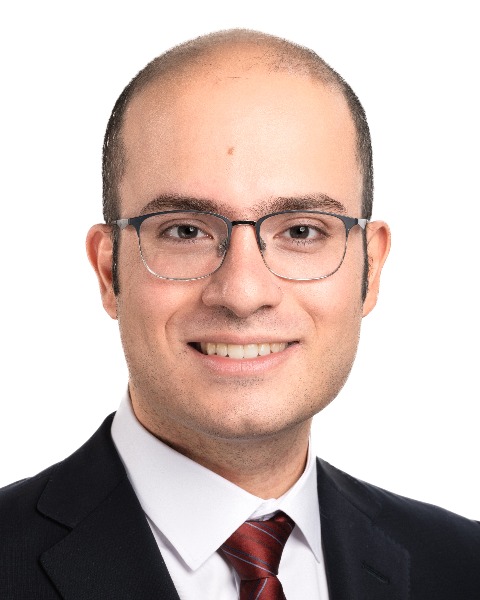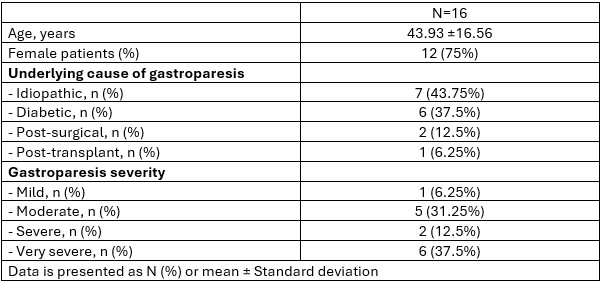Sunday Poster Session
Category: Interventional Endoscopy
P1395 - Assessing the Impact and Safety of Redo G-POEM for Refractory Gastroparesis: Insights From an International Multicenter Study
Sunday, October 26, 2025
3:30 PM - 7:00 PM PDT
Location: Exhibit Hall

Babak Mirminachi, MD (he/him/his)
University of Pittsburgh Medical Center
Harrisburg, PA
Presenting Author(s)
Babak Mirminachi, MD1, Kais Zakharia, MD2, David Tate, MBBS, PhD3, Andrea Sorge, MD4, Jan Martinek, MBBS, PhD5, Lizeth Cifuentes, MD6, Ijlal Akbar. Ali, MD7, Sultan Mahmood, MD6
1University of Pittsburgh Medical Center, Harrisburg, PA; 2Baystate Health, Springfield, MA; 3Ghent University Hospital, Ghent, Oost-Vlaanderen, Belgium; 4University of Milan, Milan, Lombardia, Italy; 5Institute for Clinical and Experimental Medicine, Prague, Hlavni mesto Praha, Czech Republic; 6University of Pittsburgh Medical Center, Pittsburgh, PA; 7University of Oklahoma, Oklahoma City, OK
Introduction: Gastric peroral endoscopic myotomy (G-POEM) has been shown to alleviate symptoms of refractory gastroparesis in 48% to 71% of cases. However, up to 44% of patients continue to experience symptoms within 12 months of the procedure, with an annual relapse rate reaching approximately 13%. Redo G-POEM has emerged as a potential solution for such patients, although evidence regarding its safety and efficacy remains scarce. This international multicenter study aims to assess the clinical effectiveness and safety of redo G-POEM, leveraging data from high-volume tertiary centers specializing in Third Space Endoscopy.
Methods: We conducted a retrospective multicenter study to identify patients with refractory gastroparesis who underwent G-POEM between January, 2021 and March, 2025. From this cohort, we identified individuals with a history of surgical pyloroplasty or prior G-POEM who subsequently underwent a repeat G-POEM due to ongoing or recurrent symptoms. The primary outcome was clinical response at 3-months or longer, defined as a ≥1-point improvement in the Gastroparesis Cardinal Symptom Index (GCSI). Procedure-related adverse events were also recorded.
Results: Sixteen patients (mean age 43.93 ± 16.56 years; 75% female) were included in the study. Of these, 3 patients (18.75%) underwent G-POEM following prior surgical pyloroplasty. The mean duration of symptoms was 5.5±5.14 years. Gastroparesis etiologies included idiopathic (n=7), diabetic (n=6), post-surgical (n=2) and post-lung transplant (n=1). The average interval between procedures was 1.10 ± 0.75 years. At baseline, gastroparesis severity was classified as very severe in six patients, moderate in five, severe in two and mild in one; two lacked pre-procedure GES. Redo G-POEM was performed in seven patients due to symptom recurrence after initial improvement (without further testing) and in six patients due to persistent gastric retention on GES along with persistent symptoms. Among the 15 patients with available follow-up GCSI scores within three months, eight (53%) showed clinical response. One intraprocedural perforation occurred and was managed with through-the-scope clipping. Two additional patients required hospitalization for nausea and vomiting, but no other adverse events were reported.
Discussion: Redo G-POEM is a technically feasible and safe intervention that offers modest clinical benefit. Prospective studies are needed to identify predictors of response and optimize patient selection.

Figure: Table 1- Clinical and Demographic Characteristics of Patients Undergoing redo G-POEM for Refractory Gastroparesis

Figure: Table 2- Participating Institutions and Number of Patients at Each Center
Disclosures:
Babak Mirminachi indicated no relevant financial relationships.
Kais Zakharia indicated no relevant financial relationships.
David Tate: Olympus – Advisor or Review Panel Member, Consultant.
Andrea Sorge indicated no relevant financial relationships.
Jan Martinek indicated no relevant financial relationships.
Lizeth Cifuentes indicated no relevant financial relationships.
Ijlal Ali indicated no relevant financial relationships.
Sultan Mahmood indicated no relevant financial relationships.
Babak Mirminachi, MD1, Kais Zakharia, MD2, David Tate, MBBS, PhD3, Andrea Sorge, MD4, Jan Martinek, MBBS, PhD5, Lizeth Cifuentes, MD6, Ijlal Akbar. Ali, MD7, Sultan Mahmood, MD6. P1395 - Assessing the Impact and Safety of Redo G-POEM for Refractory Gastroparesis: Insights From an International Multicenter Study, ACG 2025 Annual Scientific Meeting Abstracts. Phoenix, AZ: American College of Gastroenterology.
1University of Pittsburgh Medical Center, Harrisburg, PA; 2Baystate Health, Springfield, MA; 3Ghent University Hospital, Ghent, Oost-Vlaanderen, Belgium; 4University of Milan, Milan, Lombardia, Italy; 5Institute for Clinical and Experimental Medicine, Prague, Hlavni mesto Praha, Czech Republic; 6University of Pittsburgh Medical Center, Pittsburgh, PA; 7University of Oklahoma, Oklahoma City, OK
Introduction: Gastric peroral endoscopic myotomy (G-POEM) has been shown to alleviate symptoms of refractory gastroparesis in 48% to 71% of cases. However, up to 44% of patients continue to experience symptoms within 12 months of the procedure, with an annual relapse rate reaching approximately 13%. Redo G-POEM has emerged as a potential solution for such patients, although evidence regarding its safety and efficacy remains scarce. This international multicenter study aims to assess the clinical effectiveness and safety of redo G-POEM, leveraging data from high-volume tertiary centers specializing in Third Space Endoscopy.
Methods: We conducted a retrospective multicenter study to identify patients with refractory gastroparesis who underwent G-POEM between January, 2021 and March, 2025. From this cohort, we identified individuals with a history of surgical pyloroplasty or prior G-POEM who subsequently underwent a repeat G-POEM due to ongoing or recurrent symptoms. The primary outcome was clinical response at 3-months or longer, defined as a ≥1-point improvement in the Gastroparesis Cardinal Symptom Index (GCSI). Procedure-related adverse events were also recorded.
Results: Sixteen patients (mean age 43.93 ± 16.56 years; 75% female) were included in the study. Of these, 3 patients (18.75%) underwent G-POEM following prior surgical pyloroplasty. The mean duration of symptoms was 5.5±5.14 years. Gastroparesis etiologies included idiopathic (n=7), diabetic (n=6), post-surgical (n=2) and post-lung transplant (n=1). The average interval between procedures was 1.10 ± 0.75 years. At baseline, gastroparesis severity was classified as very severe in six patients, moderate in five, severe in two and mild in one; two lacked pre-procedure GES. Redo G-POEM was performed in seven patients due to symptom recurrence after initial improvement (without further testing) and in six patients due to persistent gastric retention on GES along with persistent symptoms. Among the 15 patients with available follow-up GCSI scores within three months, eight (53%) showed clinical response. One intraprocedural perforation occurred and was managed with through-the-scope clipping. Two additional patients required hospitalization for nausea and vomiting, but no other adverse events were reported.
Discussion: Redo G-POEM is a technically feasible and safe intervention that offers modest clinical benefit. Prospective studies are needed to identify predictors of response and optimize patient selection.

Figure: Table 1- Clinical and Demographic Characteristics of Patients Undergoing redo G-POEM for Refractory Gastroparesis

Figure: Table 2- Participating Institutions and Number of Patients at Each Center
Disclosures:
Babak Mirminachi indicated no relevant financial relationships.
Kais Zakharia indicated no relevant financial relationships.
David Tate: Olympus – Advisor or Review Panel Member, Consultant.
Andrea Sorge indicated no relevant financial relationships.
Jan Martinek indicated no relevant financial relationships.
Lizeth Cifuentes indicated no relevant financial relationships.
Ijlal Ali indicated no relevant financial relationships.
Sultan Mahmood indicated no relevant financial relationships.
Babak Mirminachi, MD1, Kais Zakharia, MD2, David Tate, MBBS, PhD3, Andrea Sorge, MD4, Jan Martinek, MBBS, PhD5, Lizeth Cifuentes, MD6, Ijlal Akbar. Ali, MD7, Sultan Mahmood, MD6. P1395 - Assessing the Impact and Safety of Redo G-POEM for Refractory Gastroparesis: Insights From an International Multicenter Study, ACG 2025 Annual Scientific Meeting Abstracts. Phoenix, AZ: American College of Gastroenterology.
